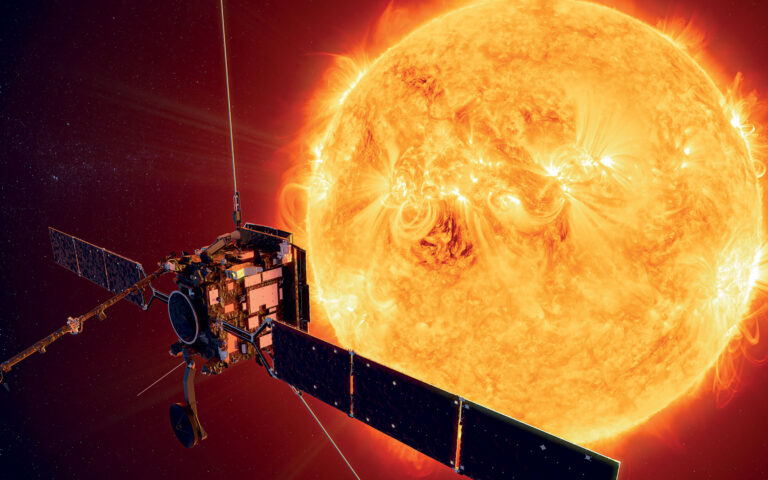How being on Earth makes us look Spy thriller heroes Hanging from a moving train 240 kilometers per hour? It looks like it universe together with Big guitar? It is Higgs field Basically a monster, Universal soup?
The above may seem incomprehensible and complicated, but if you read his book Matt Strassler “Waves on an Unfathomable Sea” Everything starts to make sense. American Theoretical physicist The last three decades have been devoted to its study string theory, her Quantum She too Molecular Physics.
Almost half of these years are devoted to the so-called popular science, That means explaining very complex scientific concepts to the average person in as simple terms as possible and without much or no math. He mainly does this through his blog “Specific Significance”.
In his new book he basically tries to explain to us how The human body works like the universe. And we sought him out to explain a few things.
– In your book “Waves in an Impossible Sea”, you lead to the conclusion that the human body works more or less the same way the universe works. What can this observation teach us about life?
– We often think of the universe as a vast black void in the distance and forget that the human world and the universe are intertwined. There is real consciousness embedded in the universe. In the end, you can see all its functions from small to big things.
The peculiar properties of atoms (i.e. physics at the quantum level) affect both the details of stars and human biochemistry. When stars like the Sun die, they become “white dwarfs” and avoid collapsing the same way our bones support our weight. Einstein's principles of relativity play an important role in the centers of stars and the mass of every human body. There is only one world and we play by its rules.
There is only one world and we play by its rules.
And there is something deeper. The fundamental particles we have created, like electrons, are more waves than particles. They are like “abbreviations” in global expanding corporations. Although the term particle implies that electrons are like grains of sand, they are more like sound waves in air. Sound waves are a sign of air moving. Similarly, the particles of our bodies are signs of the universe in motion. They are not only in the universe, they are a part of it. The same applies to us. Rather than being colonists of the universe, we emerge from it.
– So despite the similarities between the cosmos and the human system, what is their most fundamental difference?
– What differentiates organisms is their structure at a higher level of complexity. Most parts of the universe – stars, mountains, organic molecules – are very simple and can be described relatively easily. Although made of the same materials as everything else, living things are amazingly built, absorbing air and food and deriving from them the power for perception, movement, defense and, in the case of humans, complex thought. Physics is at the heart of these processes. Of course, however, there is much more to identifying what it means to be human, and it involves chemistry, biology, physiology, psychology, sociology, and more.
– In the book you mention the enormous amount of energy we carry as a species. Will all this energy be used for other purposes in the future? In other words, will we reach a point where we can recycle our own energy into new forms?
– Einstein discovered this when he realized that mass is a hidden form of energy. It is found in all persons, including non-human beings, so we do not need to acquire our own. There is more in the world than we need.
We have already learned to harness this energy in nuclear power plants where atoms split apart. This is called fission of the atom. The sun uses this energy more efficiently. Many scientists have devoted themselves to making this fusion of atoms a practical source of heat and electricity. This has proven to be very difficult, but if it ever happens, it will definitely change our society. Again, we don't need to use human power. It turns out to be more practical to use forms of hydrogen like stars.
Although the term particle implies that electrons are like grains of sand, they are more like sound waves in air.
– At one point you say “the universe sounds like a musical instrument”.
– Yes, the fundamental principle of musical instruments, as we know from Pythagoras, is vibration. What makes them reliable sound generators is the reverb effect. It comes from any musical instrument that has a steady, sustained tone. This ensures that the guitar string plays the same note every time you play it.
Meanwhile, as I said before, our bodies are made of particles, but they are waves, a form of vibrating vibrations. They are like the waves produced by a guitar string. I know it can be confusing. Indeed, the history of the “vibrational universe” is long, and explaining it is one of the main purposes of my book.
– What is the role of the Higgs field in human experience?
– is seen throughout the universe, but does not play a direct role in human experience. That's why no one suspected its existence until a few years ago. But it is very important for our life. Without the Higgs field, electrons cannot bind to nuclei and there would be no atoms anywhere in the universe. Not even our planet.
Although the existence of the Higgs field in nature and its importance have been suspected since the 60s, it was only in 2012 that its existence, known as the Higgs boson, was confirmed. Despite constant research, relatively little is known about the Higgs field. It's a part of nature that we don't particularly understand. The mathematics we use for this is much less sophisticated and more arbitrary than anything in molecular physics.
And the future of the Hicks field is in question. One day, perhaps trillions of years from now, it may prove unstable, which would spell disaster for the world. It's not something we need to worry about right now, but it could one day affect how the universe dies. Now the Higgs field holds all the atoms in the universe, and one day it may become their ultimate destroyer.

– How easy is it to “translate” such complex and difficult topics into what the average person can understand?
– It's definitely a challenge, and that's why some scientists do it. But it's something that comes naturally to me because I've always approached complex, technical ideas. If I find one, I try to make the words more simple. If I can't do that, I know I can't understand this very well. When I write, I try to do the same. I always look for analogies and ask friends to read it too so I can spot potential misunderstandings. I keep trying because I know there is always room for improvement.
– In your experience, what areas of astrophysics do the public understand well and what do they struggle with?
– I note that there is a wide range, and it has to do with whether a person has studied science on his own. Many people have heard of important scientific ideas and tried to understand them, but as few popular science books make clear, they seem to contradict each other. Because every scientist and journalist uses language differently, when they say the same thing, it seems like they don't match. I try to avoid this by choosing my words very carefully and making sure the meaning is clear.
Now the Higgs field holds all the atoms in the universe, and one day it may become their ultimate destroyer.
– I have always wondered if scientists who have entered popular scientific fields are treated differently than their colleagues who prefer a strictly academic approach. Have you ever had too much to prove in the scientific community?
– I haven't faced this problem, perhaps because I first proved who I am in education and voluntarily left a full-time academic career in my 40s. This may be related to the fact that academic scientists today are more aware of the breadth of scientific concepts. I may not be in the scientific limelight because of my exams, but my past knowledge is still useful in the field of research and it has made me respected in academic circles.
– You have also been maintaining a “Specific Science” blog for 13 years. How do you choose subjects after all these years?
– Blogging for so long has taught me a lot about how to write better. Without this, I think my book would not be accessible to the general reader. As far as topics go, there is so much to discover and I know I will never run out of ideas. What I often do when a new scientific discovery comes out is to describe it and write about the context surrounding it so that non-experts can understand it. I can always write about big science topics.

– After years of studying physics and the cosmos, what still fascinates you?
– In my own field of research, the confusion surrounding molecular physics. Some scientists give the impression that they have discovered beautiful equations that explain the universe. I would say that we have a strong but superficial understanding of what molecules do, rather than what they do. We don't know why they come in different shapes and different properties. The Higgs field is very destructive. Thus, although molecular physics is not in its infancy, it is not mature. To me, she looks like a teenage girl with a road ahead of her.
Now, outside of physics – or not outside? – There is the mystery of consciousness and the perception of time as a continuous flow. I understood how complex machines can process information at high speeds and act with self-awareness. Artificial intelligence brings new ideas to this problem. The real difficulty, however, is this: Why, instead of acting as though I am conscious, am I actually having a conscious experience? Why is it that when I eat a fresh olive, my body sends internal signals to my brain that it is good, but at the same time I enjoy the taste of the olive? It's a mystery whose solution I can't even imagine, because no scientific instrument can measure my experience of this olive flavor. It is a mystery connected to the human experience of time and life and our understanding of mortality. Nothing deep. I certainly don't expect these puzzles to be solved in my lifetime. But one of the younger readers will solve them.
Matt Strassler's book 'Waves in an Impossible Sea' is published in English by Basic Books.